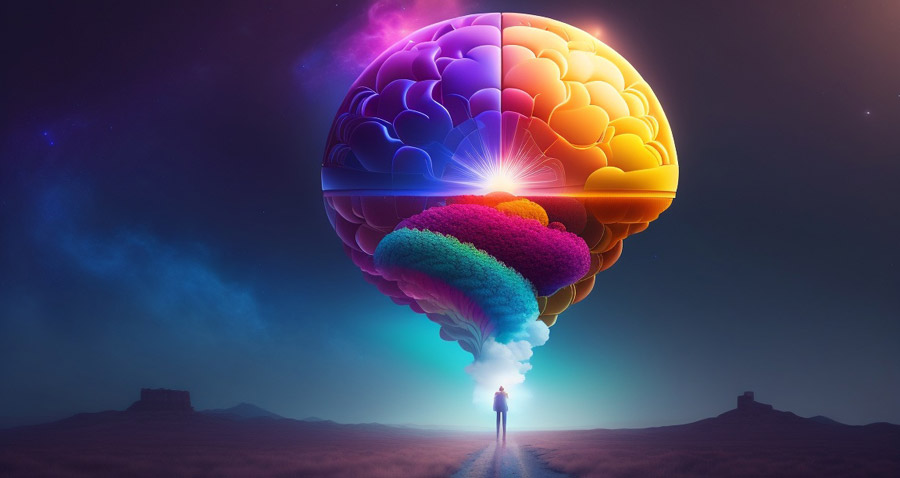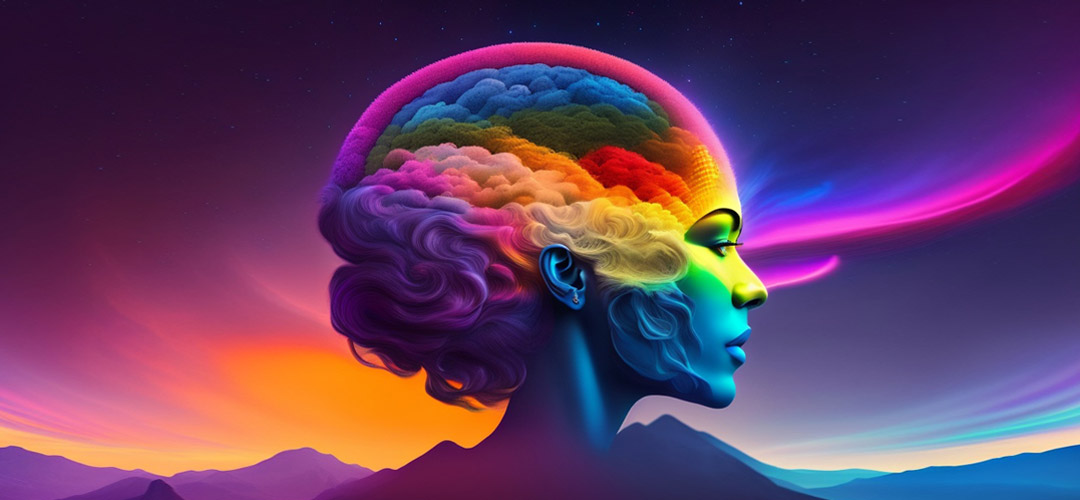What if the world was bigger than you think?
There are some experiences that scientific reasoning cannot grasp. These are experiences that we live and feel, but cannot be explained by rational theories. Among these experiences, one that is attracting increasing attention is the use of psychedelic substances. Their effects on neurons and neurotransmitters are at the center of growing public interest. For example, numerous publications on psilocybin found in magic mushrooms are piquing curiosity.
Indeed, this practice is often associated with a search for revelation, a quest for meaning, and even an improvement in the psychological state of people suffering. But what is the reality? Can altered states of consciousness provide a reliable path to knowledge or a therapeutic purpose to calm the torments of the soul? Can the human mind elevate itself beyond itself through these psychoactive substances? To answer these questions, we must explore the world of dreams, consciousness, and philosophy.
Psychedelics Legality
Before reading these few lines, it is important to remember that psychedelic substances are illegal in many countries. Furthermore, the psychedelic experience is not a harmless practice and requires some caution. The chemical introspection enthusiast must always inform themselves about the laws in force and the effects and risks of psychedelic drugs before considering pursuing their personal exploration.
A Psychedelic Alteration of Reality
Dreams are the most subjective experience that exists. It is a world that belongs only to us, where reality fades away to make room for the imaginary. Similarly, the use of psychedelic substances can transport us into a world that is not the one we know. The boundaries between what is real and what is not blur. But what do these imaginary worlds teach us? Are they the product of our minds, or are they themselves full-fledged realities? These questions are at the heart of the psychedelic experience.
Consciousness is the place where the mind unfolds within the networks of neurons in our cortex. It is a space that is transformed by neurochemistry, depending on our mental state.
States of consciousness are multiple, ranging from deep sleep to the meditative state. The use of psychedelic substances can open doors to altered states of consciousness still unexplored by most people. But can these states be considered real? Are they higher states of consciousness, or altered states that distort the perception of reality? Is consciousness really modified, or are we merely under the illusion of an elevation of consciousness? These are all questions that lead us into philosophical territory.
In Search of Revelation
The search for revelation is an eternal quest of humanity. It often takes the form of mystical or religious research, where we seek to connect with a higher power. The use of psychedelic substances is often described as a revealing experience, where we discover hidden truths. But what is the nature of these revelations? The question of the quality of the states of consciousness induced by psychedelic substances is central in philosophy. Can these states be considered superior to other states of consciousness? The notion of revelation is also complex: what is the nature of these hidden truths? Are they truly fundamental, or simply illusions caused by the substances?
The quest for revelation is a profound quest of the human mind, but is truth really attainable through these means, or should we search within ourselves, in our individuality, or in the nature that surrounds us?
Psychedelic substances as a philosophical tool
Sometimes there are unconventional ways to explore philosophy, and some turn to substances such as psilocybin mushrooms, ayahuasca, or LSD to reach unexplored levels of consciousness. This practice is often associated with modern nihilism, where morality dissolves in a meaningless universe. But these experiences should not be reduced to a simple search for a strong sensation.
Altering our emotions to change our worldview
In reality, these substances can offer a true revelation, not about the nature of things, but about our relationship to them. The truth is not found in an objective definition, but in our individual perception of reality. It is our emotions that influence the way we perceive things. Psychedelics can thus help us develop our emotional perception to see things in a new light. This alteration can be a new mental playground to explore this subjective reality and to free ourselves from our usual thought patterns.
In search of the individual
Exploring individuality is another important aspect of psychedelic experiences. They allow us to become aware of the narrowness of our worldview and to open ourselves up to new perspectives. Nature itself can seem to speak to us, and we can feel a deep connection with it: even more so, users of psychedelic mushrooms sometimes feel a harmony with the entire fungal kingdom. As if the mycelium was extending to them and integrating them into a vast network of cooperation. Fortunately, magic mushrooms do not actually connect humans to mushrooms!
Risks to consider
But these experiences are not without risks. By approaching them with a serious philosophical intention and some caution, they can offer a new perspective on the world and on ourselves. Morality does not disappear, it transforms into something more personal and subjective.
Hallucinogenic mushrooms as consciousness stimulators
Psychedelics can thus offer a unique and enriching philosophical experience, provided they are not considered an end in themselves.
In fact, it is the personal search that will lead to answers. The psychedelic substance is only a facilitator, not a miracle solution. This is also the testimony of participants in psilocybin psychedelic retreats as they exist in the Netherlands. There is no valid consumption of psilocybin truffles without preparation and classic therapeutic support (psychotherapy or hypnosis, for example).

A mind expansion ?
The limits of the psychedelic experience in philosophy
To return to our question about the psychedelic journey, it is a manifestation of the human quest to explore the mysteries of the world. It is a journey that is both shamanic and mystical, transporting the individual into spheres of consciousness that are still unexplored. But like Ulysses, every journey has its limits. The use of psychedelic substances can create a cognitive bias that alters the perception of reality. The world that one explores under the influence of these substances may not be real, but only a manifestation of our mind.
An intense and unique mental experience
The difficulty of communicating the psychedelic experience also limits its philosophical scope. How can one explain to someone who has not experienced these states of consciousness the revelations that one has had thanks to drugs? Critical reflection is therefore essential to avoid the pitfalls of a misinterpreted experience.
Like Ulysses who resisted the sirens, it is important to maintain a critical distance in order to understand the limits of the psychedelic experience in philosophy.
The ethical and political issues of psychedelics
The question of the use of psychedelic drugs cannot be addressed without a thorough reflection on the ethical and political issues it raises. While individual freedom must be protected, we must not forget the need to respect bioethical standards in terms of mental health and personal development.
Similarly, the legal psychedelic retreat, as practiced by some, should not be considered as a solution for treating depression or anxiety, but rather as a self-exploration that can have positive repercussions. Michel Foucault and Spinoza have both reflected on the issue of social control and submission to moral norms. If the vision of society is called to change, it is important to remain critical and vigilant about the effects of these substances on our perception of reality. Finally, assistance and respect must be at the heart of any development of psychedelic use for medical and therapeutic purposes, in order to avoid the risks of misinterpretation, risky behavior, or endangering others.
The question of psychedelics in society
Although they are not addictive, psychedelic substances such as psilocybin or LSD are prohibited. As with cocaine or MDMA, the question of their prohibition is central to the philosopher. Why is a molecule illegal? What legitimacy does the spiritual explorer have to violate laws? To what extent is it wise to do so against the moral vision of society?
What moral behavior to adopt?
In ethical terms, it is important to consider the implications of the use of psychedelic substances on mental health and to respect the limits of informed consent. Reflection on bioethics and medical development can help protect and assist individuals who have psychedelic experiences.
In political terms, the psychedelic experience can be linked to political and philosophical movements such as counterculture and the quest for individual freedom. However, it is important to be wary of submission to a preconceived vision of society and to consider the social and political implications of the use of psychedelic drugs. Many movements have exploited the potential of hallucinogenic drugs in modern society: the Beat Generation of the 60s, the hippies of the 70s, or the psilocybin mushroom consumers in search of well-being since the 2010s. Nevertheless, everyone must question their personal motivations and avoid ingesting anything out of mere political reaction or social mimicry.
Overall, the psychedelic experience must be accompanied by rigorous philosophical reflection to avoid pitfalls and to ensure that the experience is beneficial and productive. Philosophy can help provide a framework for understanding and interpreting the psychedelic experience, linking it to concepts such as morality, personal responsibility, and perception of reality. Ultimately, the psychedelic experience must be approached with caution, respect, and reflection in order to fully benefit from it. Furthermore, any experience with hallucinogenic drugs must take into account the risks involved. To avoid a bad trip or unpleasant and distressing situations, the adventure should never be undertaken alone. Even though exploring the mind is perfectly personal, the presence of a trusted person and a calm and secure environment are necessary conditions for a healthy and positive approach.
The Psychelic Philosopher French version Psychedelic Tree House
